|
|
|
Sort Order |
|
|
|
Items / Page
|
|
|
|
|
|
|
| Srl | Item |
| 1 |
ID:
142278
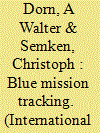

|
|
|
|
|
| Summary/Abstract |
A basic but as yet unachieved goal for UN missions is to know the exact locations of their peacekeepers at any given time. Such tracking would help field missions plan operations, avoid and respond to ambushes, kidnappings and friendly fire incidents, rapidly send reinforcements and retrieve wounded peacekeepers, ultimately saving lives. Improved effectiveness could be obtained from ‘precision peacekeeping’, where soldiers, police and civilians are deployed to precise locations and events, while operational leaders follow their movements. Fortunately, tracking technology has improved considerably so that commercial solutions for real-time tracking of personnel and vehicles are now available at lower cost and increased accuracy and sophistication, while being more user-friendly. The advances in phone and vehicle tracking systems are reviewed here to identify the benefits, drawbacks and challenges, especially any political ones, for the United Nations. The world organization can benefit from modern blue mission tracking, without having to develop costly, customized solutions. Such initiatives have few technological or financial hurdles but the politics and institutionalization of continuous positional surveillance needs policy modernization, guided by a nuanced understanding of technological empowerment.
|
|
|
|
|
|
|
|
|
|
|
|
|
|
|
|
| 2 |
ID:
005692


|
|
|
|
|
| Publication |
Geneva, Programme for Security and International Studies, 1995.
|
| Description |
68p.
|
| Series |
PSIS Occasional paper; no.2
|
|
|
|
|
|
|
|
|
|
|
|
Copies: C:1/I:0,R:0,Q:0
Circulation
| Accession# | Call# | Current Location | Status | Policy | Location |
| 037133 | 355.8245/DOR 037133 | Main | On Shelf | General | |
|
|
|
|
| 3 |
ID:
131107
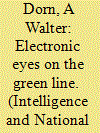

|
|
|
|
|
| Publication |
2014.
|
| Summary/Abstract |
The 1974 Cypriot War divided the island of Cyprus into two parts with a narrow demilitarized zone (DMZ) between the opposing Greek Cypriot and Turkish forces. The volatility and violence in this zone, called the 'Green Line', necessitated a constant UN peacekeeping presence that was achieved mainly with manned observation posts (OPs). About 150 of these posts were established by 1975 to maintain stability and prevent flare-ups, including any lethal exchanges between the two sides. By the early 1990s, many of the countries contributing peacekeepers to the United Nations Peacekeeping Force in Cyprus (UNFICYP) had become tired of the stalemate and the lack of progress in negotiations (peacemaking), so they withdrew their troops from the force. This necessitated a reduction in the number of constantly manned OPs from 51 in 1992 to 21 in mid-1993. Further downsizing of UNFICYP by the UN Security Council in 2004 gave rise to a new approach to monitor the DMZ and produce actionable intelligence. Cameras were installed in hot-spots in the Nicosia DMZ and more responsive patrols were introduced as part of the new 'concentration with mobility' concept. This was the first time a UN peace operation used unattended cameras to monitor a demilitarized zone. This article examines the UN's difficulties and successes using the remote cameras, especially during important incidents. Other technologies that aided UNFICYP are also reviewed for lessons that might assist an under-equipped United Nations in its watchkeeping function.
|
|
|
|
|
|
|
|
|
|
|
|
|
|
|
|
| 4 |
ID:
172165
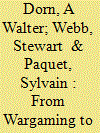

|
|
|
|
|
| Summary/Abstract |
Militaries around the world have benefited from computerized games. Many recruits have been attracted to the military through military-style video games. After recruitment, games and simulations provide an important means of soldier training, including before actual deployments. However, electronic games are lacking for UN peace operations. The multidimensionality of peacekeeping has yet to be simulated in serious games to complement the many games that too often depict a binary battlefield of blue-team versus red-team (or, often in public games, good versus evil). Not only could soldiers benefit from nuanced and ambitious peace-related games, so too could civilian peacekeepers, and the public at large. Peacekeeping gaming should not be merely at the tactical level; the operational and strategic levels can be gamed as well. The decision-making in future peacekeeping simulations could help instruct conflict-resolution and critical thinking skills. The paper posits that such digital games could be an important tool for current and future peacekeepers, both military and civilian. Commercial games could also help educate the public on UN peacekeeping. The paper suggests that the United Nations partner with some member states and perhaps the video game industry to provide in-depth training simulations that mirror the challenges and complexities of modern peace operations.
|
|
|
|
|
|
|
|
|
|
|
|
|
|
|
|
| 5 |
ID:
140875
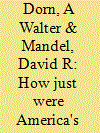

|
|
|
|
|
| Summary/Abstract |
To what degree were the wars waged by the United States ethically just? The answer is necessarily subjective, but would experts from across the political spectrum score conflicts in a similar fashion? In a survey of more than 100 international studies experts, the 18 major conflicts fought by the United States since 1900 were assessed. World War II was rated as the most just, whereas the Iraq Invasion was considered the most unjust. Respondents also scored each conflict under seven just war criteria: just cause, right intent, net benefit, legitimate authority, last resort, proportionality of means, and right conduct. The average of the criteria, the “Just War Index” (JWI), correlated strongly with the participants' measure of each conflict's overall justness, indicating the importance of the criteria. Participants who identified themselves on the political right gave higher JWI values for almost all conflicts than those on the left. The left rated seven conflicts unjust while the right found all to be just, though three only slightly so. Nonetheless, the ranking of conflicts was quite similar between the two groups. Though no conflict was deemed completely just or unjust, the US war spectrum ranged from highly “just” to highly “unjust.” The JWI approach offers a quantified and nuanced analysis of important ethical criteria—an approach that could be applied to other conflicts, including future ones.
|
|
|
|
|
|
|
|
|
|
|
|
|
|
|
|
| 6 |
ID:
068774
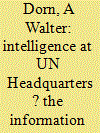

|
|
|
| 7 |
ID:
092976
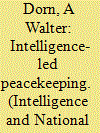

|
|
|
|
|
| Publication |
2009.
|
| Summary/Abstract |
In the slums of Haiti, where pistol and machete wielding gangs dominated the populace through murder, intimidation, extortion, and terror, a UN peacekeeping mission managed to established law, order, and government control. The United Nations Mission for the Stabilization of Haiti (MINUSTAH) succeeded by 'taking on' the gangs in a series of military and police 'search and arrest' operations in 2006-07. The achievement was made possible by thorough 'intelligence preparation of the environment'. This paper tells the story of the 'intelligence-led' military-police-civil operations and how they transformed the Haitian slum of Cit Soleil from a foreboding place inaccessible to police for years to one in which the UN workers could safely walk its streets. The functions, structures, problems and challenges of the mission's intelligence capability are described, especially the work of the Joint Mission Analysis Centre (JMAC). Human intelligence proved to be key, while technologies helped considerably. Within the United Nations, intelligence remains a controversial and sensitive matter but the Haiti mission provides a valuable model of how to gather and use actionable intelligence.
|
|
|
|
|
|
|
|
|
|
|
|
|
|
|
|
| 8 |
ID:
147559
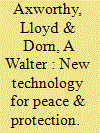

|
|
|
|
|
| Summary/Abstract |
New technological advances in areas such as digital information, algorithmic forensic data analysis, autonomous surveillance vehicles, advanced robotics, and multispectral sensors (sometimes all working together) can help avert war, introduce more effective peacekeeping and peacemaking initiatives, lessen the impact of conflict on innocent people, and help rebuild war-torn states. When international humanitarian action becomes urgent, by way of knowledge gained through such technologies, then those same peace applications can be used to reduce harmful forms of intervention and to ensure that enforcers are abiding by international law and UN guidance. An ethical failure occurs when such technologies exist to save lives, reduce risks, and secure peace, but are not employed.
|
|
|
|
|
|
|
|
|
|
|
|
|
|
|
|
| 9 |
ID:
174048
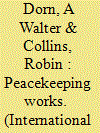

|
|
|
|
|
| Summary/Abstract |
Despite some harsh criticisms of United Nations (UN) peace operations, research demonstrates that many UN missions are successful, though evaluations depend on how success is defined. Even UN missions that fail in one or more aspects provide a net benefit to peace processes and help to save lives and alleviate human suffering. While an understanding of the flaws and limitations of peace operations can help improve the operations, some unfair criticism must be directly challenged. For instance, contrary to critiques in a recent paper by Séverine Autesserre, the UN has helped end civil wars, and it does not have a fixation on elections nor does it ignore the bottom-up approach. Most UN multidimensional missions pursue multiple levels of engagement, from local to national leaders. Elections are a key way to engage locals. With decades of experience, the UN has many positive lessons to offer in making, keeping, and building peace.
|
|
|
|
|
|
|
|
|
|
|
|
|
|
|
|
| 10 |
ID:
160802
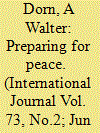

|
|
|
|
|
| Summary/Abstract |
During the Harper years (2006–2015), Canada significantly reduced the training, preparation, and deployment of military personnel for United Nations (UN) peacekeeping. Now, despite the Trudeau government’s pledge to lead an international peacekeeping training effort, Canada’s capabilities have increased only marginally. A survey of the curricula in the country’s training institutions shows that the military provides less than a quarter of the peacekeeping training activities that it provided in 2005. The primary cause of these reductions was the central focus on the North Atlantic Treaty Organization’s Afghanistan operation and several lingering myths about peacekeeping, common to many Western militaries. As the Trudeau government has committed to reengaging Canada in UN operations, these misperceptions must be addressed, and a renewed training and education initiative is necessary. This paper describes the challenges of modern peace operations, addresses the limiting myths surrounding peacekeeping training, and makes recommendations so that military personnel in Canada and other nations can once again be prepared for peace.
|
|
|
|
|
|
|
|
|
|
|
|
|
|
|
|
| 11 |
ID:
122914
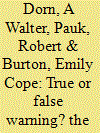

|
|
|
|
|
| Publication |
2013.
|
| Summary/Abstract |
The success of the Namibian independence plan in 1989-1990 is a high point in the history of the United Nations (UN). The enormous challenge of Namibia even predated the organization, going back seven decades on the international agenda. South West Africa (Namibia) became a mandate under the League of Nations in 1920 after Germany lost that colonial territory to the then Union of South Africa during World War I. After World War II, the mandate continued as a UN trusteeship under South Africa, but Pretoria refused to accept the required international supervision. It governed Namibia as a colony, complete with the brutal racist institution of apartheid. In 1963, its trusteeship was officially terminated by the UN Security Council and, in 1966, the UN General Assembly declared that South Africa's continued control of Namibia was illegal. Then, in 1978, in a push for Namibian independence, the Security Council unanimously passed Resolution 435 (1978), which outlined an implementation strategy for free elections. But another ten years elapsed before the United Nations and the United States gained South Africa's cooperation.
|
|
|
|
|
|
|
|
|
|
|
|
|
|
|
|
| 12 |
ID:
089217
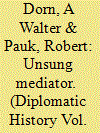

|
|
|
|
|
| Publication |
2009.
|
| Summary/Abstract |
On October 16, 1962, President Kennedy learned that the Soviet Union was building nuclear missile installations in Cuba. For the next six days the president and his advisers secretly deliberated about the American response. The new threat not only upset the nuclear balance but also placed nuclear missiles capable of destroying most U.S. cities on the territory of a new enemy, Premier Fidel Castro. As the Kennedy administration strove to keep this alarming news secret, it nevertheless shared it with the new acting secretary general of the United Nations, a quiet unassuming Burmese diplomat named U Thant.2 Specifically, on Saturday, October 20, 1962, Admiral John McCain, military adviser at the U.S. Mission to the United Nations, informed Thant's military adviser, Major General Indar Jit Rikhye, about the missiles.3 General Rikhye went to the Pentagon for a secret briefing and received an album of U.S. photos of the menacing missiles,4 which he showed to Thant. Two days later, on Monday, October 22, Rikhye informed Thant that Kennedy would be making an important television broadcast that evening concerning the missiles. Thant conferred with the U.S. ambassador to the United Nations, Adlai Stevenson,5 and a few hours later watched Kennedy make one of the most momentous presidential speeches of the century. The president announced a "naval quarantine" of Cuba, pushing the world closer to nuclear war than ever before. In the deepening crisis, the United Nations, and specifically Secretary General Thant, was to play a significant role in de-escalating and then resolving the nuclear standoff between the superpowers. Thant (Figure 1) sent appeals and messages, relayed proposals, offered reassurances, advanced the "noninvasion for missiles" formula that formed the basis of the final agreement, shuttled to Cuba to mollify Castro, and helped secure a verification arrangement.
|
|
|
|
|
|
|
|
|
|
|
|
|
|
|
|
|
|
|
|
|